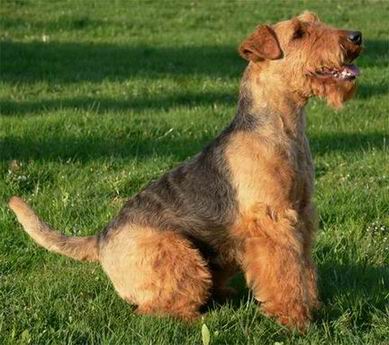
Welsh Terrier
Veterinarian Reviewed on December 23, 2007 by Dr. Janice Huntingford
Physical Characteristics
Breed Group:
Terrier
Weight:
Up to 20 pounds
Height:
Under 15 inches
Color(s):
Black and tan is the most common color; black, tan, and grizzled colors are also possible.
Coat:
Welsh Terriers are double coated, with an insulating undercoat and a rough, wiry topcoat.
Overview
Character:
The Welsh Terrier is similar in appearance to the Airedale and Lakeland Terriers, because of their shared common ancestry that can be dated back to the old English Terriers. Welsh Terriers are active and durable, and can adapt to a variety of environments. They are intelligent and sociable dogs that will make great family pets or companions.
Country of Origin:
Wales
History:
The Welsh Terrier was originally used to hunt foxes, birds, badgers, and otters. The breed was developed in Wales and can be traced back to the 1900s. The old English Black and Tan Terrier, Airedale Terrier, and Fox Terrier are believed to have contributed to the modern line of Welsh Terriers.
Name:
This breed is given the nickname “Welshie,” and is also known as “WT” among enthusiasts.
Temperament:
Welsh Terriers are affectionate, playful, and confident. They are outgoing and get along well with children and other pets, provided that adequate socialization is applied. Welsh Terriers are devote to their families, highly alert, and therefore can be great watchdogs.
Care
Training:
Welsh Terriers are intelligent and generally can be easily trained. They are obedient and enjoy lots of human companionship. They do have a hunting instinct and love to chase; this can be corrected through proper training and socialization.
Activity:
While Welsh Terriers do not require a lot of exercise, daily walks as well as other activities are needed for adequate physical and mental stimulation.
Ownership:
Welsh Terriers’ compact size makes them good apartment dogs, as long as their exercise needs are satisfied. Other than physical exercise they also need plenty of play, games, and interesting toys, otherwise they tend to get bored and become destructive. They are generally robust and have no major health problems.
Breeders
No breeders listed at this time.
Sign up for our newsletter and receive more articles and the latest pet health updates and special offers.
Our Expert
 Dr. Janice Huntingford
Dr. Janice HuntingfordJanice Huntingford, DVM, has been in veterinary practice for over 30 years and has founded two veterinary clinics since receiving her Doctor of Veterinary Medicine at the Ontario Veterinary College, University of Guelph. She has studied extensively in both conventional and holistic modalities. Ask Dr. Jan

